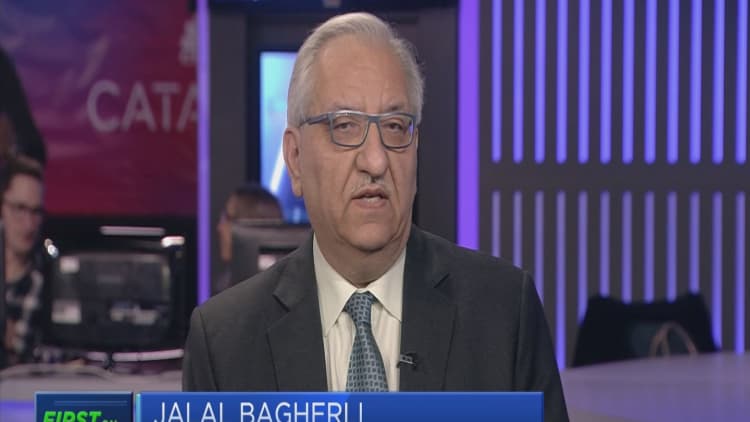
Dialog Semiconductor, the Anglo-German chipmaker that Apple is injecting $600 million into, is "carefully" monitoring the brewing trade conflict between the U.S. and China, its CEO said Friday.
Jalal Bagherli noted that many companies in the electronics space have supply chain exposure to China, but added that there were no current signs pointing to an impact on Dialog's business operations.
"Most of the high-tech companies, particularly electronics, you will have a supply chain that touches China one way or another," Bagherli told CNBC's "Street Signs Europe."
"The current trends don't impact us so much, but just like any other international business we have to watch carefully how those tariffs go up."
Trade tensions between Washington and Beijing have been simmering in recent months, with both sides imposing tariffs on one another. Some observers have raised concerns about the effect tariffs could have on semiconductor products shipped from China into the U.S.
Last week, it was announced that Apple would buy part of Dialog's business in return for a licensing deal that sees the latter supplying chips for the U.S. tech giant over the next three years. Apple will bring on roughly 300 engineers from Dialog — most of whom had already worked on chips for Apple's devices.
"Apple has been a great partner for us for the last 12 years, we've had growing business," Bagherli told CNBC. "This business becomes more and more strategic for them to in-source, to accelerate what they're trying to achieve, and in return we can license part of our technology."
"It's not actually selling the business," he added. "We retain the revenue of all our existing products, we're licensing technology and we're giving them very skilled engineers to use those technologies to create their own chips."
The transaction was significant as it showed Apple is tightening its grip on chipmaking operations for its hardware products. Late last year, shares of Dialog took a sharp dive after the company told investors Apple was planning on cutting orders for its power-management chips from Dialog by about 30 percent this year. Apple plays a huge role in Dialog's business — it accounted for 77 percent of Dialog's sales in 2018.
According to a report by Bloomberg, the firm could start using its own processors in its Mac computers as soon as 2020, a development that would be a big blow to the semiconductor giant currently making chips for Apple's Macs — Intel. The firm also has a team looking at designing its own health chips, according to multiple job listings unearthed by CNBC earlier this year.
Apple was recently dragged into controversy, however, after Bloomberg reported that tiny microchips used for surveillance had infiltrated data center equipment run by Apple and Amazon. Apple, currently the world's most valuable public company, vociferously denied the report, alongside Amazon and Super Micro, a Taiwanese-American firm reportedly linked to the spy chips.


